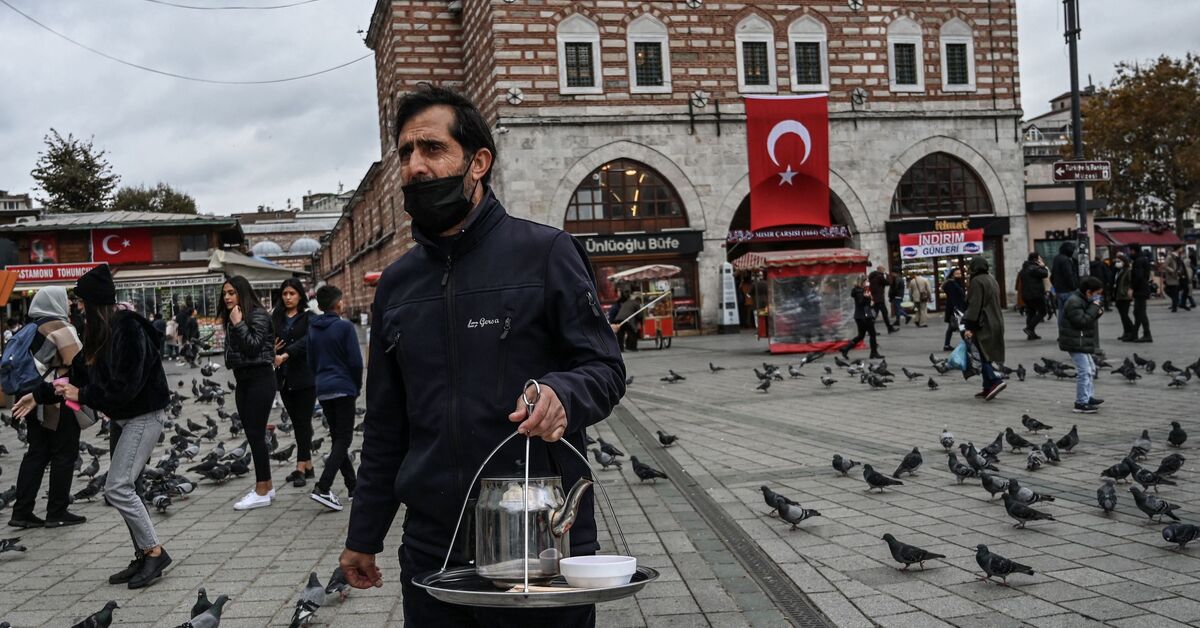On a wide staircase across the street from a popular bar in Turkey’s biggest city, crowds of people sit in the sunset, enjoying cheap drinks and snacks they brought from home. They used to go to the bar, and they’d still like to. They just can’t afford it.
“It keeps getting worse,” one waiter at the jilted bar said. “Salaries are low, but prices keep increasing. It’s frustrating for all of us,” he added, asking to remain anonymous, afraid he’d lose his job over the comment.
Turkey has, and has had for quite some time, an inflation problem. Last October, inflation hit a 24-year high of 85.5 percent on an annualized basis, meaning prices nearly doubled. This year, inflation has tempered from very high to somewhat high and is heading back toward being unsustainable. The kind of inflation that Turkey has on a monthly basis causes spasms of panic in the United States or Western Europe on an annual basis. In June, inflation was close to 40 percent year-on-year. In July, it was nearly 50 percent, and in August, it was nearly 60 percent. Investment banks and the government are in agreement that inflation will likely hit 65 percent by the end of the year. Ankara optimistically hopes to halve the inflation rate by next year.
The reason inflation went haywire is because of Turkish President Recep Tayyip Erdogan’s belief that low interest rates would somehow cap inflation. The reason it might yet come under control is because of his belated jettisoning of that very approach, experts said, marked by a sudden U-turn in monetary policy.
For a long time, Erdogan insisted that Turkish Central Bank interest rates be kept relatively low, in order to keep credit flowing and the economy humming, even though that was a recipe for inflation. Ahead of the general elections this May, Erdogan raised Turkey’s minimum wage and tapped Central Bank foreign currency reserves to prop up the lira to help stabilize the currency. It was a short-term gambit.
For now, post-elections, Erdogan seems to have gotten the gospel. In late August, the Central Bank significantly hiked interest rates for the third time since the May elections. Interest rates that were at 8.5 percent, and then leapt to 17.5 percent in July, are now at 25 percent. Higher interest rates should temper inflation by limiting the supply of easy money in an economy. They should also, in theory, prop up a country’s currency, though traders in lira haven’t gotten the memo. The Turkish lira, which in early 2008 came close to parity with the U.S. dollar, is now worth a little under 4 cents.
Erdogan has signaled a change in course by appointing Mehmet Simsek—a former deputy prime minister and Merrill Lynch banker—as finance minister, as well as Hafize Gaye Erkan as Central Bank governor. Simsek asserted Thursday that markets had faith in Erdogan’s economic stewardship. But as the musical chairs shuffle, a lot of Turks are running out of cash—and patience.
“Many household incomes are insufficient against inflation—impoverishment is now one of our biggest problems. We’re seeing an unusual inflation climb, and people are worried and disappointed,” Turkish economist Mustafa Sonmez said.
When inflation rises that much, it affects the whole society, said Istanbul University sociologist Ugur Dolgun. With thinner wallets, “people go out less, eat out less, and skip cultural outings. Food security becomes their main priority. Stress levels are higher, as is depression, anxiety, and even domestic violence,” he said. Education doesn’t fare much better.
“Students now prefer evening classes or remote education because they need to work during the day,” Dolgun said. “They are pushed out of educational life due to economic problems. It’s all a vicious cycle we need to get out of.”
Hatice, 20, wanted to share her story but asked to use a pseudonym, saying she feels that criticizing the economy could backfire on her. A sociology student in her junior year, she decided to drop out of school for the fall semester, saying financial struggles had pushed her out.
“I decided to work full time instead,” she said. “Of course I don’t want to quit my studies, but right now I can’t even afford campus accommodation. The economic crisis affects us students greatly—both in terms of not being able to afford studies as well as the fear of not finding work in our field after graduation.” For now, she has moved back in with her parents and deferred her junior year, spending her time working for an online retailer.
Turkey’s economy has struggled before. A 2001 crisis saw the stock market crash and the lira collapse, but when Erdogan came to power shortly after, he implemented new reforms. He drove exports and expanded foreign investment, all of which led to robust economic growth. The lira was doing well; the economy was booming. Many Turks were quickly catapulted to prosperity, and the economy was deemed a miracle. Hoping to further foster this growth, Erdogan eventually had Central Bank interest rates slashed—all the way down to 8.5 percent in February—before lately recanting. Many economists deemed the policy unorthodox, since lower rates would naturally fuel inflation, as well as growth.
But as many Turks in cities such as Istanbul refrain from going out for a drink or a bite, one industry has been left unshaken: tourism. Mediterranean Turkey continues to attract millions of tourists each year, surpassing 22 million visitors and generating nearly $22 billion in revenue in the first six months of this year alone, according to the Turkish Statistical Institute.
Tourists from afar can spend worry-free. It’s those workers doing the serving who are suffering.
“On the streets, the tense atmosphere is tangible,” Istanbul resident Samira Shah said.
“Turkish people are worried, on edge even. A few days ago, I woke up just after midnight to a delivery man who had, at the end of his work day, noticed that he hadn’t charged me enough for an afternoon food delivery. He was aggressively ringing my doorbell, yelling that he immediately needed the 100 lira [$3.75] he mistakenly didn’t charge me or else his bosses would take it from an already low salary. He was desperate. I think there are many like him.”
By: Stefanie Glinski
Source: FP



